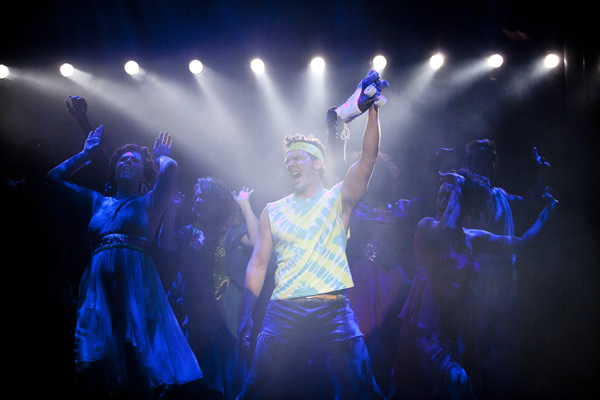Arts & Entertainment
Escapism on skates
Signature’s ‘Xanadu’ is well-executed camp fun

‘Xanadu’
Signature Theatre
4200 Campbell Ave.
Arlington, VA
Through July 1
703-820-9771

Charlie Brady, center, as Sonny in Signature’s ‘Xanadu.’ (Photo by Scott Suchman; courtesy Signature)
The “Xanadu” chracter Muse Calliope is onto something when she says the roller derby in the show is like “children’s theater for 40-year-old gay people.”
On stage now at Arlington’s Signature Theatre, this trashy movie-turned-Tony-winning Broadway adaptation is near-perfect theatrical escapism.
It’s based on the 1980 turkey that derailed the budding movie career of singer Olivia Newton-John and that featured the last movie appearance of the legendary dancer Gene Kelly as the tycoon who has chosen commerce over art. The basic plot remains the same.
Clio (Erin Weaver) is the leader of the Muses, the Greek demigoddesses who bring artistic inspiration to mortals. Disguised an Australian woman named Kira (a comic nod to Newton-John’s indelible cinematic performance), she descends to earth to bolster the confidence of Sonny (Charlie Brady), a sidewalk artist who dreams of opening a roller disco. She also encounters Danny, a real estate mogul who rejected Kira’s inspiration. Danny still owns the theater he built under her influence, and he and Sonny become business partners. Needless to say, despite a few curses, several broken rules, and some heartbreak and confusion, Sonny and Kira/Clio fall in love and skate off to their happy ending.
Writer Douglas Carter Beane (“The Little Dog Laughed” and “To Wong Foo, Thanks for Everything, Julie Newmar”) nimbly fleshes out the movie plot with campy pop culture references and a delicious new subplot featuring the nasty machinations of Clio’s jealous sisters, the muses Melpomene and Calliope. He also expands the movie soundtrack with other period pop tunes by Jeff Lynne (ELO) and John Farrar. As you might expect, the openly gay Beane brings a light touch to the clichéd plot, but he also brings some unexpected emotional depth to the story. Although the evening moves along briskly (90 minutes without an intermission), there are some slow spots (most notably the flashbacks between the ageless Clio and the young Danny) and Beane’s adaptation never fully embraces the movie’s sappy-yet-moving theme that the elusive Xanadu is the pursuit of love and art.
Under the assured hand of director and choreographer Matthew Gardiner, Signature Theatre’s openly gay associate artistic director, the creative team stitches together a frothy and effective show that is truly “an Acme of all the arts” (to use Sonny’s description of his roller disco dreams). Gardiner’s witty and energetic choreography cannily combines a send-up of disco moves for the mortals with a spoof of Martha Graham routines for the Muses and Greek gods.
He gets solid support from his designers, especially the lighting by Chris Lee (with the mandatory mirror balls) and the costumes by Kathleen Geldard (with lovely flowing Grecian robes, the requisite sequins and de rigueur leg warmers that play a surprisingly important role in the plot). They mine the comedy for all it’s worth, hit all of the right notes of the 1980s pop score (kudos to Music Director Gabriel Mangiante and his four-piece band) and put together lovely stage pictures.
Gardiner also gets strong performances from his likeable leads and a versatile ensemble that appear in a variety of roles from Centaurs to Muses to an endless array of back-up singers. Brady and Weaver play the comedy just right, with the proper balance of naiveté and campy self-awareness. Both are strong and attractive singers and dancers who bring unquenchable enthusiasm to the bubbly material.
The show shines most brightly, however, when Nora V. Payton takes center stage as Melpomene, the evil Muse of tragedy. She gets the best material in the script and she delivers with zest and finesse. Payton (who inspired audiences as Motormouth Maybelle in “Hairspray” and will no doubt thrill audiences as Effie in next season’s “Dreamgirls”) lights up the stage with her wicked sense of style, an incredible vocal presence and her gleeful delivery of verbal and physical zingers. She is given great comic and vocal support from her evil henchwoman Calliope (played by Sherri L. Edelen who also shines in a giddy cameo as a Francophile Aphrodite, goddess of love). Their duet of the rock classic “Evil Woman” is a highlight of the evening.
The skating, under the guidance of Gregory Vander Ploeg, is impressively staged and includes the tender duets between Kira and Sonny, Kira’s hilarious descent down on a staircase wearing only one skate, and the rollicking finale which brings the entire cast to the new roller disco.
Photos
PHOTOS: Montgomery County Pride in the Plaza
LGBTQ celebration held in downtown Silver Spring

Montgomery County Pride in the Plaza was held on Sunday, June 29 at Veterans Plaza in Silver Spring, Md.
(Washington Blade photos by Michael Key)























The fifth annual Fredericksburg Pride march and festival was held on Saturday, June 28. A march through the streets of downtown Fredericksburg, Va. was followed by a festival at Riverfront Park.
(Washington Blade photos by Michael Key)



















India
Anaya Bangar challenges ban on trans women in female cricket teams
Former Indian cricketer Sanjay Bangar’s daughter has received support

Anaya Bangar, the daughter of former Indian cricketer Sanjay Bangar, has partnered with the Manchester Metropolitan University Institute of Sport in the U.K. to assess her physiological profile following her gender-affirming surgery and undergoing hormone replacement therapy.
From January to March 2025, the 23-year-old underwent an eight-week research project that measured her glucose levels, oxygen uptake, muscle mass, strength, and endurance after extensive training.
The results, shared via Instagram, revealed her metrics align with those of cisgender female athletes, positioning her as eligible for women’s cricket under current scientific standards. Bangar’s findings challenge the International Cricket Council’s 2023 ban on transgender athletes in women’s cricket, prompting her to call for a science-based dialogue with the Board of Control for Cricket in India and the ICC to reform policies for transgender inclusion.
“I am talking with scientific evidence in my hand,” Bangar said in an interview posted to her Instagram page. “So, I hope, this makes an impact and I will be hoping to BCCI and ICC talking with me and discussing this further.”
On Nov. 21, 2023, the ICC enacted a controversial policy barring trans women from international women’s cricket. Finalized after a board meeting in Ahmedabad, India, the regulation prohibits any trans player who has experienced male puberty from competing, irrespective of gender-affirming surgery or hormone therapy. Developed through a 9-month consultation led by the ICC’s Medical Advisory Committee, the rule aims to safeguard the “integrity, safety, and fairness” of women’s cricket but has drawn criticism for excluding athletes like Canada’s Danielle McGahey, the first trans woman to play internationally. The policy, which allows domestic boards to set their own rules, is slated for review by November 2025.
Bangar shared a document on social media verifying her participation in a physiological study at the Manchester Metropolitan University Institute of Sport, conducted from Jan. 20 to March 3, 2025, focused on cricket performance. The report confirmed that her vital metrics — including haemoglobin, blood glucose, peak power, and mean power — aligned with those of cisgender female athletes. Initially, her fasting blood glucose measured 6.1 mmol/L, slightly above the typical non-diabetic range of 4.0–5.9 mmol/L, but subsequent tests showed it normalized, reinforcing the study’s findings that her physical profile meets female athletic standards.
“I am submitting this to the BCCI and ICC, with full transparency and hope,” said Bangar. “My only intention is to start a conversation based on facts not fear. To build space, not divide it.”
In a letter to the BCCI and the ICC, Bangar emphasized her test results from the Manchester Metropolitan University study. She explained that the research aimed to assess how hormone therapy had influenced her strength, stamina, haemoglobin, glucose levels, and overall performance, benchmarked directly against cisgender female athletic standards.
Bangar’s letter to the BCCI and the ICC clarified the Manchester study was not intended as a political statement but as a catalyst for a science-driven dialogue on fairness and inclusion in cricket. She emphasized the importance of prioritizing empirical data over assumptions to shape equitable policies for trans athletes in the sport.
Bangar urged the BCCI, the world’s most influential cricket authority, to initiate a formal dialogue on trans women’s inclusion in women’s cricket, rooted in medical science, performance metrics, and ethical fairness. She called for the exploration of eligibility pathways based on sport-specific criteria, such as haemoglobin thresholds, testosterone suppression timelines, and standardized performance testing. Additionally, she advocated for collaboration with experts, athletes, and legal advisors to develop policies that balance inclusivity with competitive integrity.
“I am releasing my report and story publicly not for sympathy, but for truth. Because inclusion does not mean ignoring fairness, it means measuring it, transparently and responsibly,” said Bangar in a letter to the BCCI. “I would deeply appreciate the opportunity to meet with you or a representative of the BCCI or ICC to present my findings, discuss possible policy pathways, and work towards a future where every athlete is evaluated based on real data, not outdated perceptions.”
Before her transition, Bangar competed for Islam Gymkhana in Mumbai and Hinckley Cricket Club in the U.K., showcasing her talent in domestic cricket circuits. Her father, Sanjay Bangar, was a dependable all-rounder for the Indian national cricket team from 2001 to 2004, playing 12 test matches and 15 One Day Internationals. He later served as a batting coach for the Indian team from 2014 to 2019, contributing to its strategic development.
Cricket in India is a cultural phenomenon, commanding a fanbase of more than 1 billion, with more than 80 percent of global cricket viewership originating from the country.
The International Cricket Council, the sport’s governing body, oversees 12 full member nations and more than 90 associate members, with the U.S. recently gaining associate member status in 2019 and co-hosting the 2024 ICC Men’s T20 World Cup. The BCCI generated approximately $2.25 billion in revenue in the 2023–24 financial year, primarily from the Indian Premier League, bilateral series, and ICC revenue sharing. The ICC earns over $3 billion from media rights in India alone for the 2024–27 cycle, contributing nearly 90 percent of its global media rights revenue, with the BCCI receiving 38.5 percent of the ICC’s annual earnings, approximately $231 million per year.
Women’s cricket in India enjoys a growing fanbase, with over 300 million viewers for the Women’s Premier League in 2024, making it a significant driver of the sport’s global popularity. The International Cricket Council oversees women’s cricket in 12 full member nations and over 90 associate members, with the U.S. fielding a women’s team since gaining associate status in 2019 and competing in ICC events like the 2024 Women’s T20 World Cup qualifiers. The BCCI invests heavily in women’s cricket, allocating approximately $60 million annually to the WPL and domestic programs in 2024–25, while contributing to the ICC’s $20 million budget for women’s cricket development globally. India’s media market for women’s cricket, including WPL broadcasting rights, generated $120 million in 2024, accounting for over 50 percent of the ICC’s women’s cricket media revenue.
“As a woman, I feel when someone says that they are women, then they are, be trans or cis. A trans woman is definitely the same as a cis woman emotionally and in vitals, and specially, when someone is on hormone replacement therapy. Stopping Anaya Bangar from playing is discrimination and violation of her rights. It is really sad and painful that every transwoman need to fight and prove their identity everywhere,” said Indrani Chakraborty, an LGBTQ rights activist and a mother of a trans woman. “If ICC and BCCI is stopping her from playing for being transgender, then I will say this to be their lack of awareness and of course the social mindsets which deny acceptance.”
Chakraborty told the Blade that Bangar is an asset, no matter what. She said that the women’s cricket team will only benefit by participation, but the discriminating policies are the hindrance.
“Actually the transgender community face such discrimination in every sphere. In spite of being potent, they face rejection. This is highly inhuman. These attitudes is regressive and will never let to prosper. Are we really in 2025?,” said Chakraborty. “We, our mindset and the society are the issues. We, as a whole, need to get aware and have to come together for getting justice for Anaya. If today, we remain silent, the entire community will be oppressed. Proper knowledge of gender issues need to be understood.”
The BCCI and the International Cricket Council have not responded to the Blade’s repeated requests for comment.
-

 U.S. Supreme Court5 days ago
U.S. Supreme Court5 days agoSupreme Court upholds ACA rule that makes PrEP, other preventative care free
-

 U.S. Supreme Court5 days ago
U.S. Supreme Court5 days agoSupreme Court rules parents must have option to opt children out of LGBTQ-specific lessons
-

 Television5 days ago
Television5 days ago‘White Lotus,’ ‘Severance,’ ‘Andor’ lead Dorian TV Awards noms
-

 Music & Concerts5 days ago
Music & Concerts5 days agoBerkshire Choral to commemorate Matthew Shepard’s life












